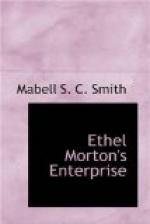“It’s too bad it isn’t a clear day,” sighed Ethel Blue, as she rose from the table.
“This is a bright day, Miss,” volunteered the waiter who handed her her unnecessary sunshade.
“You call this clear?” Mrs. Morton asked him.
“Yes, madam, this is a bright day for Pittsburg.”
When they set forth they shook their heads over the townsman’s idea of a clear day, for the sky was overcast and clouds of dense black smoke rolled together from the two sides of the city and met over their heads.
“It’s from the steel mills,” Mr. Emerson explained as he advised Ethel Brown to wipe off a smudge of soot that had settled on her cheek and warned his daughter that if she wanted to preserve the whiteness of her gloves she had better replace them by colored ones until she returned to a cleaner place.
They were to take the afternoon train up the Monongahela River to the town from which Stanley Clark had sent his wire telling his uncle that “Emily Leonard married a man named Smith,” but there were several hours to devote to sightseeing before train time, and the party went over Schenley Park with thoroughness, investigated several of the “inclines” which carried passengers from the river level to the top of the heights above, motored among the handsome residences and ended, on the way to the station, with a flying visit to the old blockhouse which is all that is left of Port Pitt.
“So this is really a blockhouse,” Helen said slowly as she looked at the little two story building with its heavy beams.
“There are the musket holes,” Ethel Brown pointed out.
“This is really where soldiers fought before the Revolution!”
“It really is,” her mother assured her. “It is in the care of one of the historical societies now; that’s why it is in such good condition.”
Roger had secured the tickets and had telephoned to the hotel at Brownsville for rooms so they took their places in the train with no misgivings as to possible discomfort at night. Their excitement was beginning to rise, however, for two reasons. In the first place they had been quite as disturbed as Dorothy and her mother over the difficulties attending the purchase of the field and the Fitz-James Woods, and the later developments in connection with the man, Hapgood. Now that they were approaching the place where they knew Stanley Clark was working out the clue they began to feel the thrill that comes over explorers on the eve of discovery.
The other reason for excitement lay in the fact that Mr. Emerson had promised them some wonderful sights before they reached their destination. He had not told them what they were, although he had mentioned something about fairyland that had started an abundant flow of questions from Dicky. Naturally they were all alert to find out what novelty their eyes were to see.
“I saw one novelty this afternoon,” said Roger. “When I stepped into that little stationery shop to get a newspaper I noticed in the rear a queer tin thing with what looked like cotton wool sticking against its back wall. I asked the woman who sold the papers what it was.”




